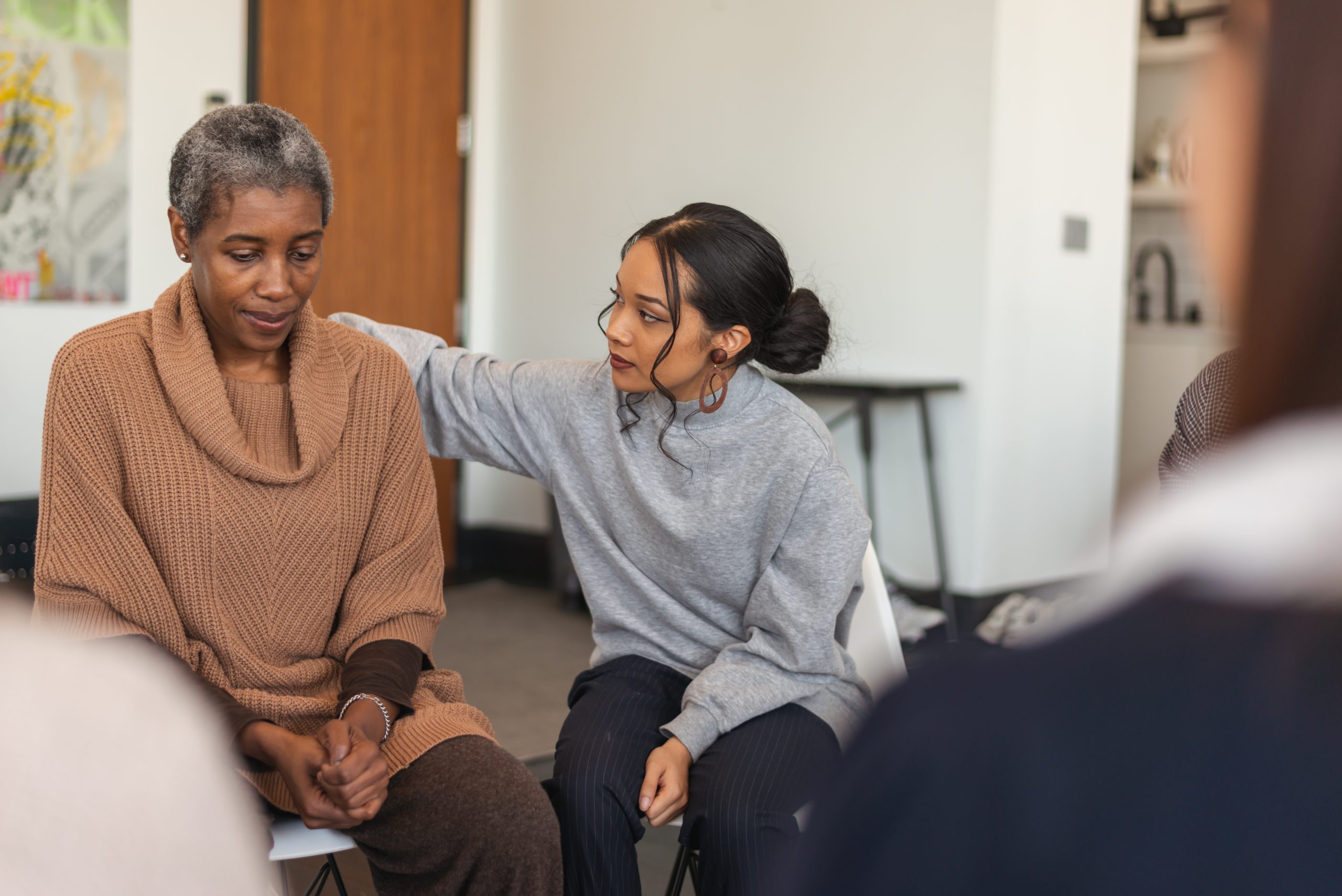Learn more about how a women’s residential treatment center can help you overcome addiction and achieve recovery.
Addiction and the path to recovery look different for everyone. Men and women seeking sobriety often have varying needs during and after treatment. A women’s residential treatment center can provide women with gender-specific treatment and support.

We’re here to help you get better. Reach out and receive personalized guidance and support.
Men and women experience addiction in unique ways. The risk factors and symptoms often vary between men and women.
A women’s residential treatment center helps women seeking recovery get the specialized care they need. These programs address the needs and goals of women at all treatment stages so that they are provided holistic and comprehensive care.
Data from the National Institute on Alcohol Abuse and Alcoholism shows addiction differs based on gender. Programs at a women’s residential treatment center consider these differences when developing treatment plans.
These specifics apply to many areas of addiction, including:1
The severity of use
Substance or substances of choice
The reasons one began using drugs or alcohol
Physical and emotional health impacts of addiction
Relapse rates
Some women achieve their treatment goals in a co-ed treatment environment. However, others may find greater success in a women’s residential treatment center.
Women often begin treatment with different needs, goals, and expectations than men. Gender-specific care helps to address these needs. It also provides a clear path toward achieving sobriety goals. Some specific considerations that gender-specific care provides includes:2
Some women find the environment at a women’s residential treatment center more comfortable. Gender-specific programs remove certain elements of mixed-gender programs that may cause unease.
For some, counseling sessions with only other women offer improved communication opportunities. It also provides a more open space for women who have past trauma related to their relationships with men.
Women’s counseling sessions encourage openness and freedom to disclose worries and fears. Women in a gender-specific program can communicate and share similar experiences, including:
Motherhood
Employment challenges
Family life
Relationships
Trauma
Some women seeking addiction treatment have a trauma history. These women may experience added challenges in a mixed-gender program.
Those who have experienced verbal, physical, or sexual trauma by the opposite sex may feel uncomfortable and unsafe in a co-ed facility. A women’s residential treatment center may lead to improved treatment outcomes.
Mothers struggling with addiction may feel more comfortable at a women’s residential treatment center. Residential treatment is often considered the most intensive, comprehensive treatment option.
There are several positives to residential treatment. However, it can be challenging for moms to step away from their families to get help. In a women’s residential treatment center, other women provide support and companionship.
Due to these potential shared experiences, moms can feel supported by other mothers. One example may be the challenges of living with addiction and trying to care for their children.
Women in a gender-specific treatment program experience peer support from other women. In these programs, everyone is on a similar sobriety journey. Participation in group counseling sessions is part of the treatment process. Groups provide an opportunity to develop a robust support system.
The relationships formed during counseling often persist long after primary treatment programs end.
Sharing the treatment experience enhances comfort and support throughout the recovery process. This helps strengthen crucial life skills. Group sessions are also an opportunity to practice coping tools, and working with peers encourages the development of self-reliance strategies.
Recovery from addiction is not a one-step process. Maintaining lasting sobriety after treatment may also involve aftercare and sober living opportunities.
These elements of treatment often act as a step down from intensive counseling. They can help ease the transition from supervised treatment to the home environment. Sober living arrangements and aftercare can help enhance positive outcomes during recovery.3
Gender-specific sober living may help in the early days of recovery. Programs that focus on gender needs can enhance comfort by:4
Providing safe spaces to continue learning about your sobriety
Focusing on physical, emotional, and spiritual healing
Reducing interactions and engagement with the opposite sex
Encouraging a focus on personal growth and a commitment to sobriety
Maintaining lasting sobriety after treatment involves ongoing effort. Upon completing a women’s residential treatment program, the next steps include continued counseling and help.
Aftercare provides an opportunity to practice and improve coping and relapse prevention skills. It is easier to achieve your recovery goals without having to worry about distractions or other risk factors. Choosing gender-specific treatment and aftercare improves your ability to heal and continue recovery.

Barriers to treatment exist regardless of gender. Many women are more likely to experience difficulty entering residential treatment due to ongoing responsibilities at home. Family obligations may also limit attending regular outpatient treatment sessions.
However, regardless of your limitations and needs, Horizon Treatment Services is here to help. Our women’s residential treatment center at Chrysalis offers counseling models unique to women’s needs.
At Horizon Treatment Services, our ultimate goal is to help you achieve sobriety and get back to living a healthy life. Our team aims to create an environment where you feel safe and supported.
Chrysalis is a home-like living environment and treatment program tailored to the needs of women with substance use and mental health disorders.
Our women’s residential treatment center is an excellent treatment option. We believe in holistic treatment, which often includes attention to:
Emotional growth
Family relations
Community support
Cultural diversity
Physical and psychological healing
Acknowledging addiction is the first step towards overcoming addiction. Our team at Horizon Treatment Services understands the journey to lasting recovery has challenges.
Let us help you overcome addiction and get the help and healing you deserve. Contact us today to learn more about our programs.